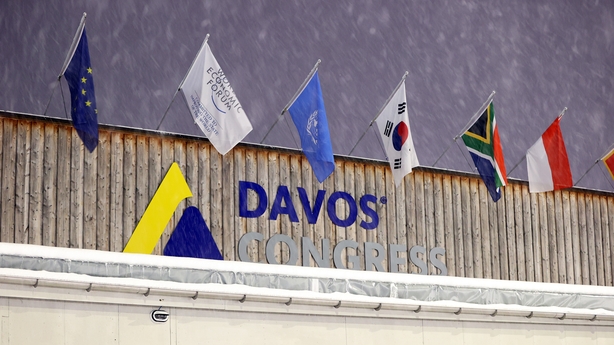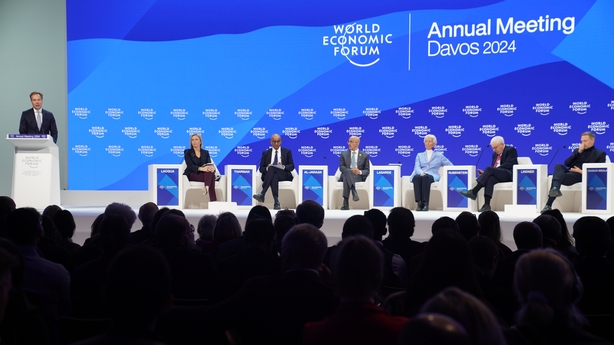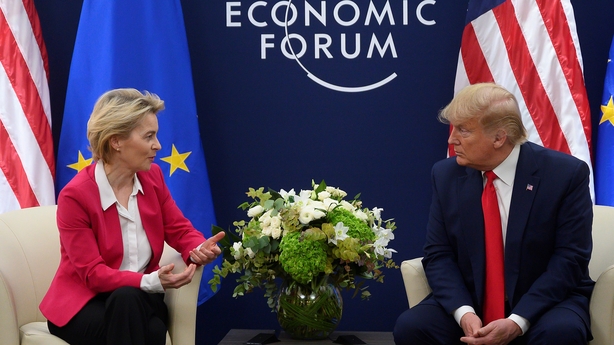The organisers of the annual snowbound gathering in Davos say this year's event comes at a "highly consequential moment for the world", an understatement if ever there was one.
Ahead of the meeting, the World Economic Forum’s (WEF) president and CEO Børge Brende said three decades of global cooperation following the end of the Cold War had "definitely ended" and "we don’t really know what the new world order is about".
The organisers this year see an unparalleled moment when spectacular technological advances are colliding with deep geo-political instability.
In other words, while generative AI, biotech, clean-tech, health-tech, robotics, sensing technologies, and advanced energy technologies all hold out the promise for human advancement, if governments and geopolitical blocs are cooperating less than ever, will that lead to a dystopian - rather than utopian - future?
"On the one hand," says the WEF’s managing director Mirek Dušek, "we are living through quite a unique time in terms of rapid technological advancement, exponential innovation; on the other hand, we are tracking deep forces of fragmentation geopolitically [and] geo-economically."
If that lack of cooperation deepens, WEF experts warn of a Depression-era style loss in GDP of 7%.
That the forum opens the same day as Donald Trump’s inauguration will add multiple layers of angst or jubilation, depending on which side of an increasingly polarised divide you’re on.
Davos comes in for perennial abuse as being a fun park for the 1% (of the 1%), while fairly wacky conspiracy theories proclaim that the Swiss ski resort is home to an evil cabal bent on forcing populations to survive on insects and live in pods.
It is, in reality, an ever expanding tent, with participants including charities, human rights campaigners, experts on global hunger and climate change, academics, novelists, women’s rights campaigners, anti-slavery campaigners, tech influencers, musicians, footballers (David Beckham this year), philanthropic Hollywood stars and a broad representation from the Global South.

'Collaboration for the Intelligent Age'
Guided (or not) by this year’s theme 'Collaboration for the Intelligent Age', just under 3,000 participants and 300 speakers will fly, drive and helicopter their way to the Swiss Alps - one of the highest ever participation levels, with greater numbers of executives coming in from emerging markets.
A stellar line up will include (by video link) the newly inaugurated President Trump, and in person, UN Secretary General António Guterres, European Commission President Ursula von der Leyen, German Chancellor Olaf Scholz (and his electoral rival, CDU leader Friedrich Merz), Ukraine President Volodymyr Zelensky, ECB President Christine Lagarde, South Africa President Cyril Ramaphosa, China Vice-Premier Ding Xuexiang, Palestinian Prime Minister Mohammad Mustafa and Israeli President Isaac Herzog.
Russian political and business leaders have been barred from Davos since Vladimir Putin’s invasion of Ukraine in 2022.
Due to the Dáil vote for the new Government there will be no Taoiseach for the first time in years, a scheduling misfortune which has left IDA Ireland in something of a pickle, as their annual dinner for global CEOs is usually hosted by the Taoiseach of the day.
On stage addresses, panel discussions and in-conversations-with are packed into a dense schedule in and around the Congress Centre that dominates the centre of the ski resort.
It is not uncommon for world leaders and their delegations from every corner of the globe to sweep past rivals (or enemies) on their way to and from speaking venues in the crowded Congress Hall, or to literally bump into each other at the many packed cocktail receptions that stud the Davos Promenade as night falls over the snowy peaks.
Aside from the utopian star-gazing by tech entrepreneurs, asset managers and Fortune 500 power brokers, there will undoubtedly be a sense of anxiety overshadowing the gathering.

WEF organisers are adept at tailoring discussions and themes to the news zeitgeist, so all eyes will be on Mr Trump and what he might say about tariffs, China, Ukraine, slashing regulations, pulling out of climate talks; what the Qatari prime minister Sheikh Mohammed bin Abdulrahman Al Thani, Israeli President Isaac Herzog and the UN’s special envoy to Gaza have to say about the Israel-Hamas ceasefire; what light the Syrian foreign minister Asaad Hassan Al Shibani will shed on the new dispensation in Damascus; whether President Zelensky will unveil any hopes and fears about a possible end to Russia’s war in Ukraine.
Davos would not be the same without the consciousness-raising side gatherings and think-ins.
Each day starts with 'Immersive Meditation' at the Global Cooperation Village. Tuesday alone has sessions on 'Refugees and their Olympian Spirit', 'Africa's Momentum', 'Fighting Poor Water' and 'Adding Trillions with Gender Parity'.
Interspersed with such enlightened topics will be discussions like 'Banks: Change on all Fronts?', 'Industries in the Intelligent Age' and 'The Geoeconomics of Energy and Materials'.
Thought-leader led actions towards challenging climate change
For an organisation whose motto is 'Committed to Improving the State of the World', the WEF produces annual run-up statements which spell out how grim things actually look.
Its Global Risks Report for 2025 highlights an increase in armed conflict, geopolitical tensions, global fragmentation, the rise in disinformation, instability, a loss of trust in governance, debt levels higher than at any time since World War II, economic risks brought on by extreme weather, biodiversity loss and ecosystem collapse.
Mr Brende did his best to sound positive in a briefing to journalists ahead of the gathering: "We are expecting an historic annual meeting in Davos with unparalleled participation at the highest level, both on the business side, government side, and we are ready to roll up our sleeves to make the best out of a situation where we faced with many, many challenges."
Climate change is one of those challenges which has become increasingly insurmountable.
The WEF’s leader on nature and climate, Gim Huay Neo, warned ahead of the meeting that without collaboration, the world will not be able to tackle the emergency, which has seen global temperatures rise to 1.54C above pre-industrial levels, with natural carbon absorbers such as forests and bogland at risk of losing resilience, meaning they will turn into carbon emitters.
"[Our] analysis looks at companies that account for two thirds of global market capitalisation, and the stats will reveal that only about 10% are making meaningful and tangible action on the climate, nature agenda," she told a briefing.

Tensions around the return of Trump
If a recurring theme at this year’s event is that societies need to collaborate more effectively if irreversible harm is to be avoided, both on the climate and technology fronts, then Mr Trump’s return represents a clear challenge to that ideal, given his threat to put the US's - and his own - interests first.
Mr Trump will therefore be the elephant on every stage until his own appearance by video-link on Thursday.
His threat of tariffs against Europe, China, and just about anywhere that does not pay the required tribute to MAGA-land, could have unquantifiable consequences for the world (and US) economy.
What will his second term mean for US-China relations, for the war in Ukraine, for the Middle East peace process?
What will the elevation of tech bro disruptors and dominators like Elon Musk and Mark Zuckerberg to the Court of Trump mean for AI, for freedom of speech, for tech regulation, in particular that generated by the EU?
The WEF’s chief executive has said that during the first Trump administration global trade and investment grew, and that despite the US president-elect's disdain for global trade rules, 70% of the world’s trade still happens under the auspices of the WTO.
"Even in a polarised, fragmented world, where more and more countries are sticking to their national interest, there is also strong interest in collaborating because it really makes sense," he told reporters.
Once Mr Trump has been sworn in, on the very day Davos kicks off, he may well start issuing executive orders to deport thousands of people from the United States, and to impose punitive tariffs on goods from around the world, potentially fuelling a sharp economic downturn in Europe.
Davos delegates will need all the immersive meditation they can get.







